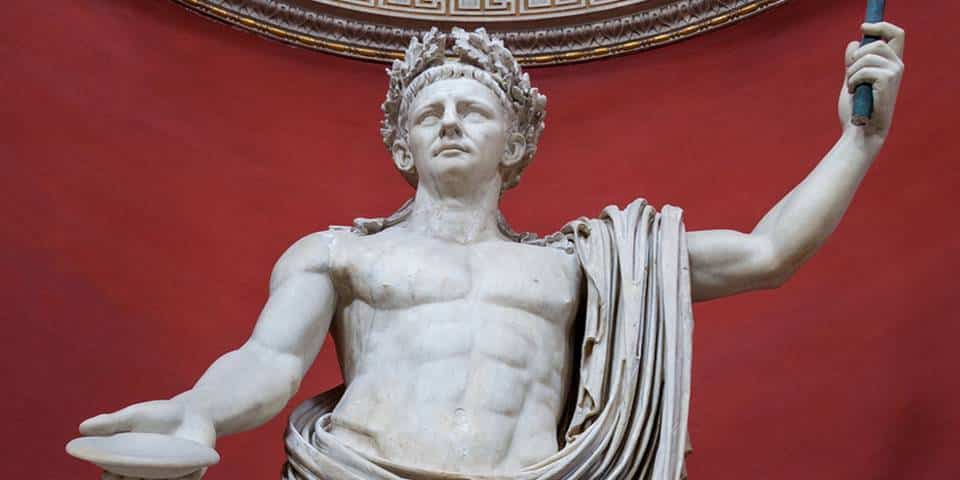

25065 views

Tiberius Claudius Caesar Augustus Germanicus (1 August 10 BC – 13 October 54 AD) was Roman Emperor from 41 AD to 54 AD. He was a representative of the Julio-Claudian dynasty and son of Drusus and Antonia Minor (daughter of Mark Antony). Claudius was born at Lugdunum, Gaul, and became the first emperor to be born outside of the borders of Italy. However, because he was stunned by weakness and deafness due to illness at a young age, his family excluded him from public service before his consulate, which he shared with his nephew Caligula at 37 years old.
Potential enemies did not see Claudius as a serious treat because of his infirmity
His survival led to his reign of 13 years. Praetorian Guard declared him an emperor after the assassination of Caligula because he was the last male member of his family. He did not have any experience, but still, Claudius proved to be an efficient administrator. During his reign, many new roads, aqueducts, and canals across the Roman Empire were built. Moreover, the Empire began the conquest of Britain.
Claudius presided over open trials and issued up to twenty edicts a day. Throughout his reign, he was considered vulnerable, especially by nobles. Claudius was constantly forced to strengthen his position, which led to the deaths of many senators. According to historians, he was murdered by his wife. After death, Nero succeeded Claudius as Emperor, his grand-nephew, stepson, and adopted son.
Contents
ToggleClaudius was Caligula’s uncle and brother to Germanicus. His maternal grandparents were Mark Antony and Octavia Minor, sister of Augustus, so that he was the great-great grandnephew of Gaius Julius Caesar.
The parental grandparents of Claudius were Livia, the third wife of Augustus, and Tiberius Claudius Nero. In 9 BC, his father, Drusus, died during the campaign in Germany, and Claudius was left to be raised by his mother. In addition, his mother never married again. Claudius’ disability became evident over a short period of time, and his mother started to use him as an example of stupidity. Moreover, for the reason of his weakness, he lived with his grandmother Livia for several years. When Claudius became a teenager, his symptoms waned, and he acquired scholarly interests.
In 7 AD, Livy started to teach him history with the assistance of Sulpicius Flavus. Expectations about his future began to grow
Emperor Augustus died in 14 AD when Claudius was 23 years old. Tiberius became the new emperor, who allowed Claudius to begin the cursus honorum and granted consular ornaments to him. Despite contempt from the Imperial family, most probably from the very beginning, the public respected Claudius. Moreover, after the death of Augustus, the knights (equities) chose Claudius to become the head of their delegation. When his house burned down, the Senate offered its reconstruction at public expense. Moreover, they also allowed Claudius to debate in the Senate.
When Drusus died, Claudius became considered a potential heir. However, it was the period of the terror and power of Sejanus, the Praetorian Guard, and Claudius decided to downplay this opportunity. When Tiberius died, the new Emperor Caligula (the son of Germanicus, Clausius’ brother) made Claudius his co-consul in 37. However cruel and insane in terms of reign, Caligula relentlessly humiliated his uncle: played jokes, took huge sums of money from him, and oppressed in front of the Senate. Later, in 41 AD, Caligula was assassinated because of the conspiracy, including the Praetorian leader Cassius Chaerea and senators. It is not clear today if Claudius took part in the assassination. Moreover, Caligula’s wife and daughter were also murdered as a sign that Cassius wanted to wipe out the Imperial family.
Even though the Senate did not really want it, Claudius became an efficient emperor who proved his skills and was proclaimed on the initiative of the Praetorian Guard. The first act that he had to make as an emperor was to execute Cassius Chaerea and other conspirators, the assassins of Caligula. Claudius managed to bring peace to Rome. Moreover, he built a new harbor at Ostia, created an imperial civil service, and made an agrarian reform.
Claudius abolished the treason trials of Caligula and expanded territories of the Empire further into the Middle East and the Balkans.
Finally, he completed the conquest of Mauritania, started by Caligula, and conquered Britain. Claudius also wanted to have military glory, leading his army through Gaul and across the Channel into Britain. As a result, with little opposition, he turned the island into submission. Like all his predecessors, Claudius was paranoid, angry and put many of his enemies to death. Like Caligula, he had problems with Jews who lived in Rome and prevented their riot, and he expelled them from the city.
Emperor Claudius personally judged many of the legal issues. However, historians claim that there were many judgments with strange verdicts that sometimes did not follow the law. Nevertheless, since the law was his personal interest, he paid a lot of attention to the operation of the judicial system. During his reign, Claudius prolonged the summer and winter court sessions and shortened the traditional breaks. The minimum age for jurors became 25 years old to ensure a more experienced and professional candidate.
The emperor settled disputes in the provinces of Rome. He freed the island of Rhodes from Roman rule for their good faith and Ilium (Troy) from taxes. At the beginning of his reign, he had difficult relationships with the Greeks and Jews of Alexandria. Lately, the famous “Letter to the Alexandrians” confirmed Jewish rights in the city.
Claudius issued many edicts with different topics. For instance, one of the most famous edicts concerned the condition of sick slaves. Masters left sick slaves in the temple of Aesculapius on Tiber Island to die instead of helping them with medical care and returning them back if they stayed alive. Claudius ordered that slaves who were thus abandoned and restored after such treatment would be free. In addition, masters who decided to kill slaves rather than take care of them could be blamed for the murder.
Claudius worked on many public projects during his 13 years of reign. He built two aqueducts: the Aqua Claudia, begun by Caligula, and the Anio Novus and restored the Aqua Virgo. The emperor paid special attention to transportation by building canals and roads throughout Italy. Among the canals was the one that led from the Rhine to the sea. Moreover, a road from Italy to Germany was finished by him, where his father, Drusus, initiated both these projects.
Also, a navigable canal nearby Rome on the Tiber was built by Claudius. It led to Portus, located just north of Ostia. At the same time, the port of Ostia was one of his main projects, which acted as a solution to the frequent grain shortages during the wintertime. He granted special privileges to sailors, including citizenship and exemption from the Lex Papia-Poppaea (the law regulating marriage). It was made to ensure the ships of grain dealers who were ready to risk going to Egypt in the off-season.
Since the Praetorian Guard chose the emperor, he put lots of effort into pleasing the Senate. Claudius refused all his predecessors’ titles, including Imperator, at the start of his reign. He wanted to earn them by himself and prove his skills as a successful emperor. Moreover, Claudius allowed the Senate to issue its own bronze coinage, which happened for the first time since Emperor Augustus’ reign. Under the Senate’s control, Claudius put the Imperial provinces of Macedonia and Achaea back.
During the reign of Claudius, the secretariat was divided into bureaus, where each was under the reign of one freedman. The emperor had to increase their role as the powers of the Princeps became more centralized. Of course, one of the reasons was the hostility of the Senate. After the new law, the freedmen could officially speak for the Emperor. However, since they had total control of money, letters, and law, they could manipulate the Emperor. The senators were shocked that they were placed in the hands of former slaves. However, according to some historians, the freedmen were loyal to the emperor.
Despite the fact of the extent of the political power, the freedmen managed to accumulate wealth through their positions.
Claudius had strong opinions about the new form of a state religion. He refused the request of the Alexandrian Greeks to build a temple dedicated to his divinity by replying that only gods may choose new gods. Claudius re-instituted observance and archaic language. Moreover, he wanted to spread the Eleusinian mysteries, which many people had practiced during the Republic time. Thus, the emperor expelled many astrologists ad rehabilitated the old Roman soothsayers. He was particularly cruel to Druidism because of its differences with the Roman state religion and its proselytic activity.
Claudius loved games. Moreover, it is said that he rose with a crowd after gladiator fights and impetuously praised the fighters.
During his reign, he also created many new events. For example, he instituted games that took place in honor of his father on the day of his birthday. Other games took place annually in honor of his accession at the Praetorian camp since it was the place where he had been proclaimed Emperor. Famous naval battles also were organized by the emperor to mark the attempted draining of the Fucine Lake.
Claudius was married four times. Undoubtedly, he wasn’t lucky with women. He married twice during his reign, and Messalina and Agrippina had an influence over him to accomplish many of their own purposes.
Claudius’ marriage to Agrippina wasn’t the best decision. The manipulative wife was insane about the idea of having her son Nero named the next emperor. In the beginning, she wanted her son to Marry Claudius’s daughter, Claudia Octavia but changed her plans when Nero became adopted by Claudius. Thus, he became his successor. Consequently, Agrippina became suspected of his death since the emperor died shortly after eating poisoned food given to him by his lovely wife. As she wanted, Nero ascended to the throne, but she did not expect what could happen to her life in the coming future.
I, Claudius is a 1976 BBC Television version of Rober Graves’ I, Claudius and Claudius the God. Derek Jacobi stars as the main protagonist with Sian Phillips, Brian Blessed, George Baker, Margaret Tyzack, John Hurt, Patricia Quinn, Ian Ogily, Kevin McNally, Patrick Stewart, and John Rhys-Davies. The episodes show the history of the early Roman Empire from the perspective of Roman Emperor Claudius.
Author: Kate Zusmann
This website uses cookies. For more info read the cookies policy
Rome.us © 2026. Created with love by Roman experts and guides.